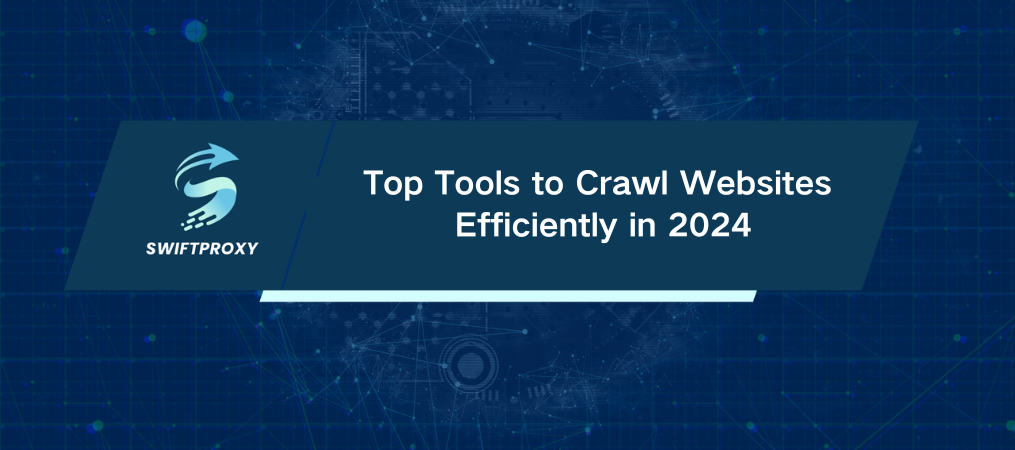Top Tools to Crawl Websites Efficiently in 2024

The digital landscape is evolving rapidly, and with billions of web pages to explore, the need for effective data collection tools to crawl websites is more critical than ever. From market research to competitive analysis, web crawlers play a key role in efficient, automated data extraction. With so many options available, choosing the right one can be challenging. Let's explore the top 5 free web crawlers in 2024 and determine which one best suits your needs.
What Does Web Crawler Mean
A web crawler—sometimes called a spider—acts like an automated browser, hopping from link to link across the web to collect valuable data. Think of it as a digital explorer, gathering information as it navigates through pages. It's not just about browsing; crawlers download and parse content, helping search engines index sites or enabling businesses to collect data for analysis.
But how do they work? The process is simple yet powerful. The crawler starts with a webpage, tracks all the links it finds, and continues its journey, crawling deeper into the web with each step. This recursive behavior allows for the collection of massive amounts of data across vast networks.
However, web crawlers aren't without their challenges. Anti-crawling technologies like CAPTCHA and rate limits can stand in their way. To overcome this, crawlers must be optimized to handle these barriers, ensuring they can still gather data effectively.
Key Differences Between Crawlers and Scrapers
While people often confuse web crawling with web scraping, the two serve different purposes. Web crawlers focus on exploring a broad range of pages and indexing content, which is why search engines like Google use them. Scraping, on the other hand, hones in on extracting specific, structured data, such as prices, product details, or customer reviews.
In short, crawlers are about the journey, scraping is about the destination. Crawlers sweep across the web, while scrapers dive into the details.
Is Web Scraping Allowed
Web scraping is generally legal, but the rules can get tricky. Search engines like Google rely on scraping to index websites. However, scraping data without permission—especially personal information—can lead to legal issues. The key is compliance. Be mindful of privacy laws and make sure you're not violating terms of service or collecting unauthorized data.
The Best 5 Free Web Crawlers in 2024
1. Scrapy
If you're a developer with some experience under your belt, Scrapy is your go-to tool to crawl websites. This open-source Python framework excels in data mining and web scraping tasks.
Key Features:
Fully customizable crawler behavior
Concurrent request handling
Automatic deduplication (no repeated crawling)
Highly expandable
Best For: Experienced developers seeking a powerful, flexible crawler.
2. Beautiful Soup
Looking for something simple yet effective? Beautiful Soup is perfect for extracting data from web pages that might have messy code. It's an excellent tool to crawl websites for those who don't want to spend time fiddling with complex setups.
Key Features:
Handles poorly structured pages with ease
Easy to learn and use
Adapts to most use cases
Best For: Beginners or anyone needing quick, simple data extraction.
3. Octoparse
For those seeking a user-friendly, visual web crawler, Octoparse is a great option. No coding skills are needed, as the graphical interface makes it highly intuitive. It can handle various tasks, from dynamic content to complex login scenarios.
Key Features:
Visual interface (no coding required)
Handles complex tasks like logging in and paging
Fast crawler setup
Best For: Non-technical users who need an easy, no-code solution.
4. ParseHub
ParseHub is a feature-rich, flexible tool to crawl websites that's great for more complex web content. It can handle AJAX and dynamic websites, making it a standout for users who need to crawl challenging sites.
Key Features:
Supports dynamic content like AJAX
Multiple export options (CSV, Excel, etc.)
Customizable crawlers without coding
Best For: Users looking to extract data from complex websites.
5. WebHarvy
WebHarvy stands out as a simple yet powerful tool to crawl websites for image and product data scraping, particularly for e-commerce users. It's a visual tool, making it accessible to those without any programming knowledge.
Key Features:
Visual interface
Excellent for image scraping
Quick and easy setup
Best For: E-commerce businesses or anyone needing image-heavy data.
Conclusion
Web crawlers are essential tools for navigating websites in today’s data-driven world. Whether you're an experienced developer or a business owner with limited coding skills, there's a tool available to meet your needs. Proxies can further enhance web crawlers by helping bypass restrictions and maintain anonymity during data collection. The five crawlers we've discussed offer distinct advantages. The key is to select the one that best suits your project. Experiment with different options to find what works for you.

















































